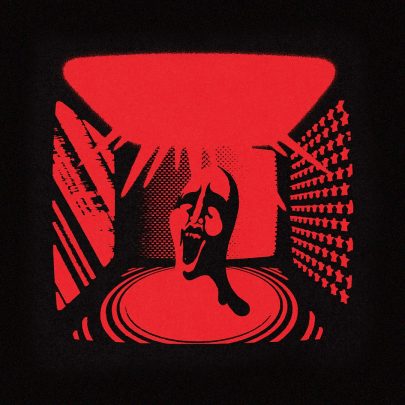Jul 14, 2014 Film & TV
The wonderfully weird Michel Gondry presents the inside of Noam Chomsky’s head.
Is The Man Who Is Tall Happy? stars just two people: French director Michel Gondry, one of film’s most artful creators, in conversation with American linguist, philosopher and political activist Noam Chomsky. As Chomsky talks, Gondry’s direct-to-film animations dance off each other in vivid, retro colours, beautiful images leaping ahead and falling behind as the famous academic keeps on talking through it all.
“I think what I was trying to do is to find the strongest connection between what Noam was saying and what was going on in my brain while listening to him,” says Gondry, from France, where he is making his next film (his previous works include The Science of Sleep, Eternal Sunshine of the Spotless Mind and an episode of Flight of the Conchords). “To me it’s like doing a musical instrument where you forget the instrument. Your brain’s directly connected to the melody. I find this tune very direct.”
Gondry’s animation style owes much to the jaunty, music-driven work of 20th century film artists Oskar Fischinger, Norman McLaren and our own Len Lye, for whom the Frenchman has high praise. “I adore his work. He envisioned the future with the limitation of the technology of his time, and I think that’s what artists ought to do — be creating what will be the norm later.”
The conversations began in 2005 when Gondry was artist-in-residence at Massachusetts Institute of Technology, Boston’s nerd paradise. He often found himself in Chomsky’s office having long chats and, after showing the philosopher some experimental drawings, Chomsky agreed to let Gondry film a series of conversations on the linguist’s favourite topic: how humans are genetically predisposed to understand complex language patterns from birth. Or something like that.
It’s the “or something like that” — Chomsky is famously resistant to well-polished soundbites — that drives the animated part of the film. Sometimes the doodles dance around Chomsky’s talking head, other times they take over the whole screen, moving between direct interpretation and abstract reverie, depending on the topic.
An occasional voice-over punctuates the narrative, giving the audience some comic relief, as if we’re not the only ones struggling to catch up. “I tried to be honest and just admit that it was a world I didn’t get,” Gondry laughs. “There are some subjects we approached several times in the documentary because they are really obscure, like the perception of the real world from our brain. It’s something that is very difficult to grasp, so we came back several times.”
For those hoping that with all the time spent together, Gondry — a master of whimsy — might be the one to tap into “the real Noam Chomsky” beyond the academic-speak, there’s not much on offer. Chomsky lives a quiet life, doesn’t seem to rate happiness as important, and is frank about existence: “I think we go from dust to dust and there’s no meaning to life.”
But it’s clear Chomsky takes joy in being “puzzled about what seems obvious”, and Gondry did find a way to sneak some romance into the film. “He doesn’t like to talk about his private life, but he could not stop talking about his wife. It was extremely touching.” When two figures representing Chomsky and his late wife go giddily bicycling along, it’s the loveliest thing. “When he saw the final film, that was his favourite moment.”
Bonus news, for those less interested in giddy bicycling than in the political Noam Chomsky: he features in another festival film, New Zealander Sarah Cordery’s documentary Notes to Eternity, which is a meditation on the Israel-Palestine conflict.





